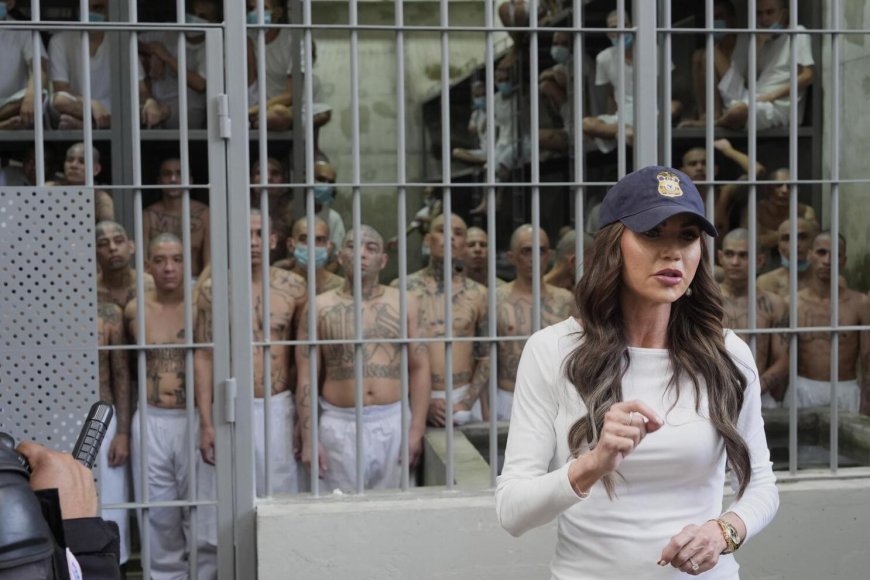Inside El Salvador’s Mega-Prison: A Chilling Tour with Secretary Kristi Noem
When U.S. Homeland Security Secretary Kristi Noem stepped inside El Salvador’s notorious mega-prison, she wasn’t just touring another correctional facility. She was walking into a stark, windowless world where thousands of men—many with shaved heads, dressed in identical white uniforms—stood shoulder to shoulder, locked away with no clear future. An Associated Press photographer captured haunting […]

When U.S. Homeland Security Secretary Kristi Noem stepped inside El Salvador’s notorious mega-prison, she wasn’t just touring another correctional facility. She was walking into a stark, windowless world where thousands of men—many with shaved heads, dressed in identical white uniforms—stood shoulder to shoulder, locked away with no clear future.
An Associated Press photographer captured haunting images from the visit, offering the world a rare look inside one of the toughest prisons on the planet. But this visit wasn’t just about crime in El Salvador—it was deeply connected to the United States’ controversial immigration policies, raising tough questions about justice, fairness, and human rights.
A Prison Unlike Any Other
The Terrorism Confinement Center (CECOT) is no ordinary prison. Built in Tecoluca, El Salvador, it’s designed to hold up to 40,000 people. Unlike most prisons, there’s no outdoor time, no rehabilitation programs, and no visits from family. Once you’re inside, you disappear from the outside world.

As Secretary Noem walked through the towering facility, she saw row after row of inmates crammed into cells meant for far fewer people. Some of these cells hold as many as 70 men. The air is heavy, filled with silence and a sense of fear. The guards patrol constantly, ensuring absolute control.
For El Salvador’s government, this prison is a symbol of strength in the fight against gangs. For the people inside, it’s a place where hope is nothing more than a memory.
Why Are Venezuelans Here?
Many of the prisoners Secretary Noem saw that day weren’t Salvadoran—they were Venezuelans deported from the United States. Under an old law called the Alien Enemies Act of 1798, President Trump’s administration removed these men without trials or clear evidence of wrongdoing, labeling them as members of the violent Tren de Aragua gang.
But here’s the problem: Some of them might not actually be gang members. They were sent to El Salvador with no legal hearings, no opportunity to defend themselves, and no chance to appeal. Their home country, Venezuela, has no diplomatic ties with El Salvador, so they don’t even have consular support.
They are simply trapped, forgotten in a foreign land.
A System Without Mercy
For those locked inside CECOT, there is no second chance. There’s no court date to look forward to, no legal process working in their favor. Many of the Venezuelans detained here haven’t even been formally charged with crimes. They’ve just been placed in a high-security prison, unable to contact their families, unsure if they’ll ever be released.
Some are now fighting for their freedom through legal petitions, but in a country where gang crackdowns are often swift and severe, their chances seem slim.
What Did Secretary Noem Say?
During her visit, Secretary Noem met with El Salvador’s President Nayib Bukele to discuss crime-fighting strategies and deportations. Bukele has become famous for his strict approach to gangs, and his government claims that these harsh policies have dramatically lowered crime in El Salvador.
But not everyone agrees with this approach. Critics argue that locking people away in inhumane conditions doesn’t actually fix crime—it just hides it. Some worry that innocent people are being caught up in these mass detentions, their lives destroyed without any real evidence against them.
For the United States, the visit raises difficult questions: Is deporting people to a prison like this really the right thing to do? Is America turning its back on justice in the name of security?
What Happens Next?
Noem’s visit to CECOT has ignited fierce debate over how the U.S. handles immigration and deportation. While some support the idea of removing suspected criminals, others fear that people are being locked away without fair trials.
CECOT isn’t just a prison—it’s a symbol of a much bigger issue. It represents a world where justice is often swift and unforgiving, where human lives become political talking points, and where being in the wrong place at the wrong time can mean losing everything.
For the men locked inside, the future is uncertain. And for the world watching, the question remains: Is this justice, or is it something else entirely?


















































